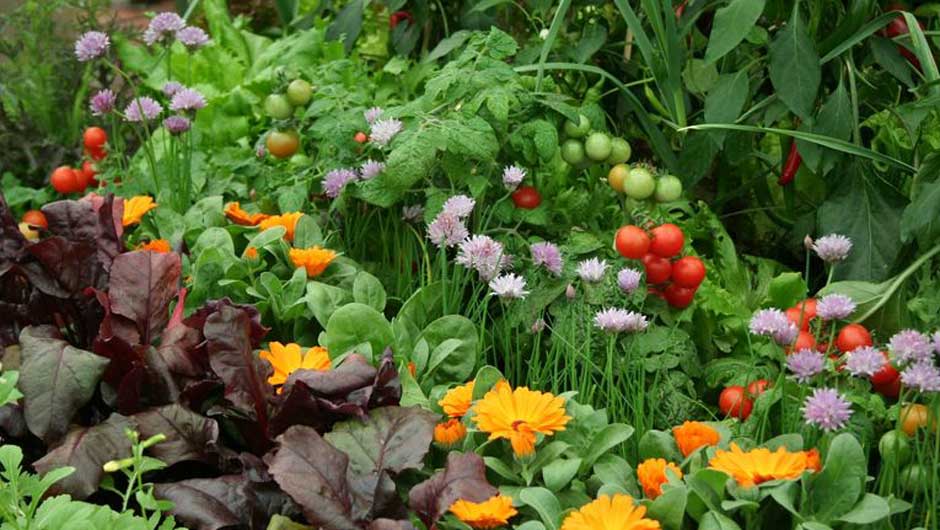If you’re a gardener, you’ve probably heard about companion planting. It’s the practice of growing certain plants next to each other in order to benefit both plants. The benefits of companion planting are many and can be seen in everything from healthier plants to more bountiful harvests. Here are just a few of the many benefits of companion planting in your garden.
Pest Control
One of the main benefits of companion planting is pest control. By growing certain plants together, you can naturally repel pests without the need for chemicals. For example, marigolds are known to repel nematodes, while basil is said to repel flies and mosquitoes. Additionally, planting onions, garlic, or chives alongside your other plants can help deter aphids and other insect pests. By incorporating companion planting into your garden, you can reduce the need for pesticides and other harmful chemicals.
Nutrient Uptake
Another benefit of companion planting is improved nutrient uptake. Different plants have different nutrient needs, and some plants can help provide the nutrients that others need. For example, legumes like peas and beans fix nitrogen in the soil, which can benefit nearby plants like tomatoes and peppers. Similarly, plants like spinach and lettuce have shallow root systems and can benefit from being planted alongside deeper-rooted plants like carrots and beets, which can help break up compacted soil and provide access to deeper nutrients.
Pollination
Companion planting can also improve pollination in your garden. By planting flowers that attract pollinators like bees and butterflies, you can help ensure that your plants are pollinated and that you have a successful harvest. Plants like borage, lavender, and sunflowers are all great options for attracting pollinators to your garden. By incorporating these flowers alongside your vegetables and herbs, you can increase the number of pollinators in your garden and improve your overall harvest.
Weed Control
Companion planting can also help control weeds in your garden. By planting certain plants together, you can help shade the soil and reduce weed growth. For example, planting a ground cover like clover alongside your vegetables can help shade the soil and reduce the need for weeding. Additionally, certain plants like mint and oregano have natural weed-suppressing properties and can help keep weeds at bay. By using companion planting to control weeds, you can reduce the amount of time and effort you need to spend weeding your garden.
Improved Flavor
Finally, companion planting can help improve the flavor of your vegetables and herbs. Certain plants have natural properties that can help enhance the flavor of others. For example, planting dill alongside your cucumbers can help enhance their flavor, while planting rosemary alongside your beans can help bring out their natural flavor. By using companion planting to improve the flavor of your vegetables and herbs, you can create a more delicious and satisfying harvest. It’s important to make sure your plant always have the correct amount of water, this is where a self-watering planter may come in handy.
In addition to these benefits, companion planting can also help create a more beautiful and diverse garden. By incorporating a variety of plants into your garden, you can create a more visually appealing space that is also more beneficial to your plants. Whether you’re a seasoned gardener or just starting out, companion planting is a simple and effective way to improve your garden and enjoy a more bountiful harvest.
Some popular examples of companion planting are:
Beans, peas, and other legumes can help provide nitrogen to the soil, which is beneficial to many other plants.
Tomatoes and basil are a classic companion planting duo. The basil can help repel pests while the tomatoes benefit from the nutrients released by the basil.
Marigolds are often used as a companion plant to deter pests, especially nematodes.
Planting garlic and onions alongside your other vegetables can help repel pests and improve overall plant health.
Cucumbers and radishes are also good companion plants, as the radishes can help deter cucumber beetles while the cucumbers can provide shade for the radishes.
Carrots and onions are another great pairing, as the carrots can help break up compacted soil for the onions, while the onions can help repel pests and improve the flavor of the carrots.
Finally, planting flowers like marigolds, zinnias, and sunflowers alongside your vegetables and herbs can help attract pollinators and create a more visually appealing garden.
Can Companion Planting work for you?
Companion planting is a great way to create a healthier, more productive garden without relying on harmful chemicals or pesticides. By using plants to naturally repel pests, improve nutrient uptake, control weeds, and enhance flavor, you can create a thriving garden that provides both beauty and bounty. Whether you’re a beginner or an experienced gardener, incorporating companion planting into your gardening practice is an easy and effective way to improve your garden and enjoy a more sustainable harvest.

